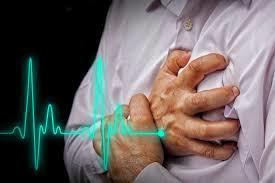 ATC
ATC

A heart attack is a medical emergency in which the supply of blood to the heart becomes blocked, often as the result of a blood clot.
SOME WARNING SIGNS LISTED BY THE AMERICAN HEART ASSOCIATION (AHA)
discomfort, pressure, squeezing, or fullness in the chest that lasts several minutes or resolves then returns
pain or discomfort in the arms, neck, back, stomach, or jaw sudden shortness of breath
Other signs can include a cold sweat, a sick or nauseous feeling, or being lightheaded.
When a person has these symptoms, the emergency services should be called immediately.
PREVENTING A HEART ATTACK
The best way of preventing a heart attack is to have a healthy lifestyle.
Measures for healthy living include the following:
Not smoking
Eating a balanced, healthful diet
Getting plenty of exercise
Getting plenty of good quality sleep
Keeping diabetes under control
Keeping alcohol intake down
Maintaining blood cholesterol at optimum levels
Keeping blood pressure at a safe level
Maintaining a healthy body weight
Avoiding stress where possible
Learning how to manage stress
DIFFERENCE BETWEEN A CARDIAC ARREST AND A HEART ATTACK
A heart attack is the blockage of an artery leading to the heart and a cardiac arrest involves the heart stopping the pumping of blood around.
RECOVERY AFTER A HEART ATTACK
Recovering from a heart attack can be a gradual process. It may involve:
Slowly resuming physical activity: It is vital that a recovering heart attack patient stays active. However, a specialist should design an exercise program for them.
Returning to work: The appropriate time for someone to go back to work depends on various factors, including the severity of the heart attack and the type of job they do. It is vital not to rush back to work.
A period of depression: Many people who have had a heart attack experience depression not long afterward. Those who feel depressed or anxious should tell their doctors.
Driving again: Experts advise that a person refrains from driving for at least 4weeks after a heart attack.
Erectile dysfunction: Approximately one-third of men have problems getting or sustaining an erection after a heart attack. It is important that men with erectile dysfunction talk to their doctors, as medication can restore function in most cases.
Experts say that sexual activity does not raise a person's risk of having another heart attack.
FACTORS THAT INCREASE THE RISK OF A HEART ATTACK
Age: Heart attacks are more likely when a man is over 45, and when a woman is over 55.
Angina: This causes chest pain due to lack of oxygen or blood supply to the heart.
High cholesterol levels: These can increase the chance of blood clots in the arteries.
Diabetes: This can increase heart attack risk.
Diet: For example, consuming large quantities of saturated fats can increase the likelihood of a heart attack.
Genetics: A person can inherit a higher risk of heart attack.
Heart surgery: This can lead to a heart attack later.
Hypertension: High blood pressure can put unnecessary strain on the heart.
Obesity: Being significantly overweight can put pressure on the heart.
A Previous heart attack.
Smoking: Smokers are at much higher risk than non-smokers.
HIV: People who are HIV-positive have a 50 percent higher risk.
Work stress
STABILIZE PLAQUE
IN A NUTSHEL
Cholesterol is a key risk factor because it contributes to the development of plaque, the fatty build up that reduces blood flow to the heart. Follow the rule of 40: Lowering your total cholesterol by 40 points reduces your heart attack risk by about 50%. Drop it another 40 points, and you cut your risk in half again.
REDUCE STRESS
The risk of having a heart attack on a Monday, the most stressful day for most people, is up to twice as high as on other days of the week. Try to keep stress and other "negative" emotions under control—with regular exercise, relaxing hobbies, yoga, listening to music, etc.
GET MORE DIETARY FIBER
Dietary fiber helps prevent heart disease by lowering cholesterol, blood pressure and blood sugar. Most people get only one-third of the recommended
30g daily of fiber. Sources of dietary fiber: Beans, beets, prunes, citrus fruits and grains. It's a good idea to start your day with a breakfast cereal containing at least 10g of fiber per serving.
EAT FISH TWICE A WEEK
Heart disease is quite uncommon among people who eat lots of fish. Certain unsaturated fatty acids unique to fish are thought to be responsible for this protective effect.
